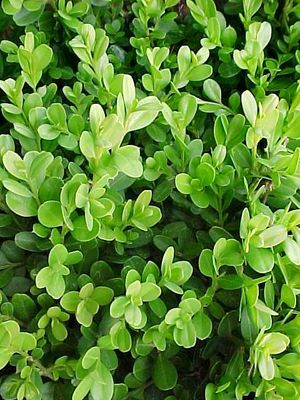Print This Page
Boxwood, Japanese
Buxus microphylla 'Japonica'
Japanese Boxwood is a popular evergreen shrub admired for its versatility in landscaping. It is celebrated for its dense foliage and compact growth habit, making it an ideal choice for hedges, topiaries, and formal gardens. One of its standout features is its ease of trimming into various shapes and forms, making it a favorite among gardeners who enjoy sculpting precise designs. Japanese Boxwood responds well to pruning, allowing for intricate detailing and maintaining its desired appearance.
In addition to its aesthetic appeal, Japanese Boxwood boasts shallow root systems, making it suitable for planting near structures or in confined spaces such as urban gardens. However, this characteristic also requires careful attention to watering, as shallow roots are more susceptible to drying out. Mulching around the base of the plant helps retain moisture, regulates soil temperature, and suppresses weed growth, promoting overall health and vigor. Furthermore, mulching provides a protective layer for the roots, particularly beneficial during hot, dry summers commonly experienced in Texas regions.
Native to East Asia, including Japan and China, Japanese Boxwood thrives in well-drained soils with a slightly acidic, fertile, loamy soils enriched with organic matter. Adequate drainage is essential to prevent waterlogging, which can lead to root rot. Additionally, planting Japanese Boxwood in partial shade to full sun exposure ensures optimal growth and foliage density, though it can tolerate some shade.
|
|
 |
Height:3 Feet
|
 |
Spread:3 Feet
|
 |
Spacing:2-3 ft
|
Interesting Notes
Leaves are toxic to pets.
USDA Hardiness Zone 6b
Available Sizes:
| Item |
Description |
| BOX-JAP-05 |
#003 BOXWOOD, JAPANESE |

|
| BOX-JAP-15 |
#015 BOXWOOD, JAPANESE |

|
Characteristics & Attributes
|
Deer Tolerance
|
Exposure
|
Habit
|
Soil pH Preference
|
|
Water Needs
|








